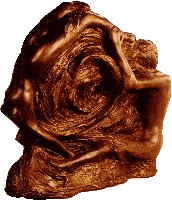|
English 393—Honors
Seminar: The Epic Hero
Dr. Michael Bryson
Sierra Tower 832
818-677-5695
michael.bryson@csun.edu
|
 |
COURSE DESCRIPTION
Epic poetry involves the vast sweep
of events that change worlds, often bringing one world to an end while
attending the birth of another. Set in such times, epics are usually
violent affairs, and the epic hero is a figure who cannot be safely
contained within the warp and woof of everyday life, as the work of such
heroes involves war, destruction, and a violent rejection and/or
reordering of the conditions of the society out of which they arise.
What is it about such figures, and such stories, that has demonstrated
such lasting appeal? This course will try to come to terms with what it
means for us to define heroism in terms of violence, war, and death.
EVALUATION METHOD
Discussion, student presentations, and a final research essay
(12-15 pages).
Assignments
1) Each student will do an in-class
presentation of 10-15 minutes on a theory or theorist of myth (from a
list to be distributed by the instructor).
2)
Each student will do a conference-style presentation of a preliminary
version of their final research project. The conference length paper
will be a maximum of 8 pages, will be distributed to the rest of the class, and presented
in-class during weeks 14-15.
3) Each student will do a final
research essay of 12-15 pages, ideally a more comprehensive version of
the project presented in class.
When researching,
excellent
sources for journal articles include JSTOR (http://www.jstor.org/),
Project Muse (http://muse.jhu.edu/),
and Academic Search Elite (http://library.csun.edu/restricted/ebsase.scr).
These databases must be accessed from the CSUN campus, or from
off-campus with your campus email user name and password.
Quotations from the works you deal with—and quotations from secondary
sources—should follow MLA format.
The final project should be turned in at
the end of Finals week.
COURSE
PREVIEW
Week 1:
Introductions, start Miller, The Epic Hero (52-69)
Week
2: Finish Miller,
The Epic Hero
(70-187, 370-387)
Week 3: Gilgamesh
Week 4:
The Iliad 1-12
Week 5: The Iliad 13-24
Week 6:The
Odyssey
1-12
Week 7:The Odyssey
13-24
Week 8: The Aeneid
1-6
Week
9: The
Aeneid
7-12
Spring Break
Week 10:
The Mahabharata
Week 11:
The Bhagavad-Gita
Week 12: Paradise Lost 1-6
Week 13:
Paradise Lost
7-12
Week 14:
Research Presentations (5-6 papers of
no more than 15-20 minutes reading length--8 pages, distributed
to the rest of the class)
Week 15:
Research Presentations (5-6 papers of
no more than 15-20 minutes reading length--8 pages, distributed
to the rest of the class)
READING LIST
(All
books will be available at the Norris Center Bookstore.
Note: Obtaining and using the recommended editions is most
important where a translator is noted.
If the work was originally in English, the particular edition
recommended is less critical.)
1)
The Epic Hero—Dean A. Miller
ISBN: 0801870941
2)
Gilgamesh—Stephen Mitchell edition
ISBN: 0743261690
3)
Iliad—Robert Fagels, trans.
ISBN: 0140275363
4)
Odyssey—Robert Fagles, trans.
ISBN: 0143039954
5)
Aeneid—Robert Fagles, trans.
ISBN: 0670038032
6)
Mahabharata—William Buck edition
ISBN: 0520227042
7)
Bhagavad-Gita, Barbara Stoler Miller translation
ISBN: 0553213652
8)
Paradise Lost
ISBN: 0451524748
|